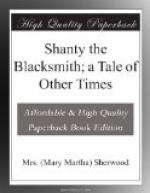“You rave, Sir,” said Tamar. “Who do you take me for?”
“A dream,” he answered. “I have been dreaming again;” and he raised himself, shook his head, rubbed his hands across his eyes, and looked as usual; but before he could add another word, Dymock and Shanty entered the parlour.
Rebecca had been too late in preventing their crossing the bridge, and they with some difficulty made the old gentleman understand that if he had any valuables, they must ascertain whether the place in which they were kept was any way approachable by the cavern. They also told him that they had taken means to have the exterior mouth of the cavern upon the knoll, stopped up, after the gang were in it; that they had provided a considerable force for this purpose; and that they should bring in men within the Tower to seize the depredators. Dymock then requested Tamar to return to Mrs. Margaret, and remain quietly with her; and when she was gone, the bridge was drawn up, and she went back to the cottage.
She had much to tell Mrs. Margaret, and long, very long,—after they had discussed many times the singular scene between Salmon, Rebecca, and Tamar, and spoken of what might be the plans of Dymock and Shanty for securing the Tower,—did the remainder of the day appear to them. Several times they climbed to the edge of the glen, to observe if aught was stirring; but all was still as usual. There stood the old Tower in solemn, silent unconsciousness of what might soon pass within it; and there was the knoll, looking as green and fresh as it was ever wont to do.
At sun-set Tamar and Mrs. Margaret again visited this post of observation, and again after they had supped at eight o’clock. They then returned and shut their doors; they made up their fires; and whilst Tamar plied her needle, Mrs. Margaret told many ancient tales and dismal predictions of secret murders, corpse-candles, and visions of second-sight, after which, as midnight approached, they became more restless and anxious respecting their friends, wondering what they would do, and expressing their hopes, or their fears, in dark sentences, such as these:—“We trust no blood may be shed!—if there should be blood!—if Dymock or poor Shanty should be hurt!” Again, they turned to form many conjectures, and put many things together:—“Was Mr. Salmon connected with the gipsies who had brought Tamar to the moor?—Was it this gang that proposed robbing him?—Was the young blacksmith called Harefoot connected with the gipsy?—Had he persuaded Salmon to bring his treasures there, in order that he might pilfer them?—And lastly, wherefore was Mr. Salmon so affected both times he had seen Tamar?” Here, indeed, was a subject for conjecture, which lasted some hours, and beguiled the sense of anxiety. At length the morning began to dawn on that long night, and Tamar went out to milk Brindle, whose caprices had, in fact, the day before, been the first mover in all this confusion. Cows must be milked, even were the master of the family dying; and Tamar wished to have this task over before any message should come from the Tower; and scarcely had she returned to the cottage, when the lad who administered the wind to Shanty’s forge, came running with such haste, that, to use his own words,—“he had no more breath left for speaking than a broken bellows.”




